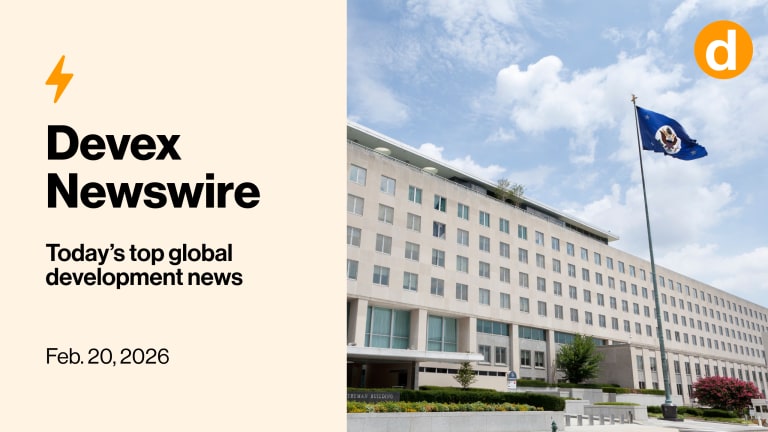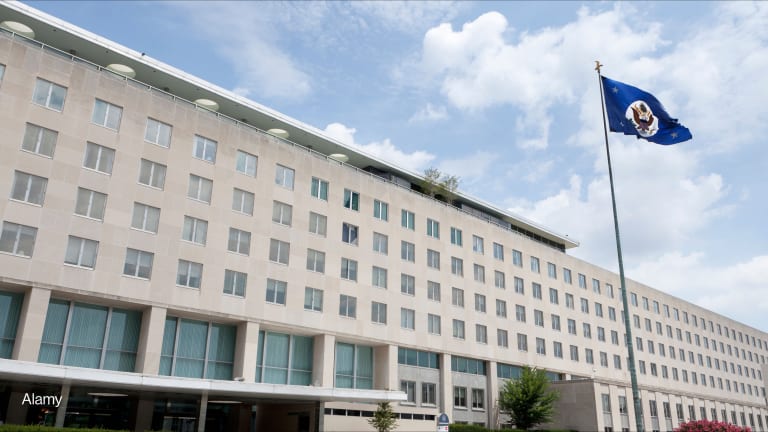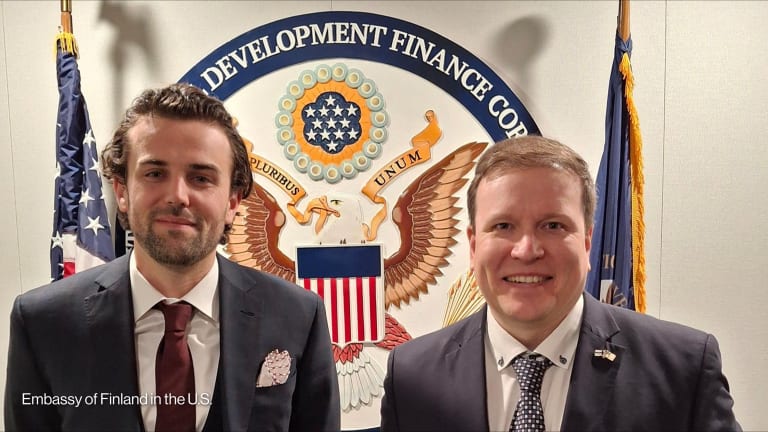Q&A: What exactly does the State Department's 'F' bureau do?
Jim Richardson, director of the State Department's Office of U.S. Foreign Assistance Resources — or "F" bureau — talks about goals, priorities, and the office’s role in a turbulent budget environment.
WASHINGTON — The Office of U.S. Foreign Assistance Resources was established more than a decade ago, but the often under-the-radar State Department entity has a new leader who is eager to push for improved use of data and better coordination. Jim Richardson has been in his job as the director of the office, often referred to as the “F” bureau, for only a few weeks. He moved over from the U.S. Agency for International Development, where he served as assistant to the administrator in the Bureau for Policy, Planning and Learning and as coordinator of USAID’s “Transformation Task Team.” Devex sat down with Richardson to ask about the office’s priorities, his goals in the job, and what the office’s role is in a turbulent budget environment. This interview has been edited for length and clarity. “F’s primary mission is to help link strategy to budgets, and then budget to performance, and then allow performance to impact our strategies.” --— Jim Richardson, director, Office of U.S. Foreign Assistance Resources There are a lot of people who don’t know a lot about the Office of U.S. Foreign Assistance Resources, and it has changed over the years. How would you describe F’s mandate? F’s primary mission is to help link strategy to budgets, and then budget to performance, and then allow performance to impact our strategies. Budgets should not dictate policy. Budgets should not dictate strategies; budgets need to resource strategies. And that's what the F bureau is here to do. We're here to take the strategies and policies of the secretary and turn them into a unified, strategically coordinated budget to ensure that we have great alignment between the two. But just having a policy that's resourced isn't good enough. You've got to make sure that you are monitoring, evaluating, that you're having performance standards, that you're understanding whether your programs and resources have any impact. Because if something doesn't have impact, we should stop doing it. What is the role or influence of the F Bureau within the State Department today? F is not here to determine what the policies should be. Foreign assistance in and of itself is neither good nor bad, is neither impactful or unimpactful. It is simply a tool. Now, how we use it, how we continue to refine it — that's what's going to make it effective or not effective. “Foreign assistance in and of itself is neither good nor bad, is neither impactful or unimpactful. It is simply a tool.” --— Obviously we don't create the policy here, but we receive the policy. We make sure that we resource it appropriately, coordinated hopefully across the U.S. government, but at least coordinated between State and USAID, even though I think the secretary's mandate is broader than that. We are certainly wanting to have conversations to make sure that our resources are coordinated much more broadly across the interagency. But then we want to make sure that performance piece is built in as well. And so that's really our comparative advantage. What we can bring to the conversation is making sure we have alignment of budget, that the secretary has the data that he needs to help inform decisions, and that we're able to do the performance data on the backend to ensure that our aid is in fact effective. In the past few years the Trump administration has repeatedly requested significant cuts to the foreign aid budget, and Congress has pushed back. How does your work on effectiveness impact those budget discussions, and what is F’s role in this process? People are going to have different views on how much foreign assistance we should be providing, and that's a really healthy conversation — an important one to have and one that happens every year. My obligation, and the F's obligation, is to make sure that every dollar that we spend aligns to support the administration's foreign policy objectives, and that we are spending every dollar and dime effectively. And so it's not just aligned to the strategy, but it's also in line with the performance. And again, foreign aid isn't good or bad inherently, it's only how people want to use it. It's a tool — and whether they want to use a lot of that tool and or a little of that tool and focus on other tools. However, policymakers want to make a determination. My responsibility is solely to make sure that every dollar is aligned to support the administration's policies and that they are used wisely and responsibly. What are your goals in the new position? My basic goal is to strategically coordinate assistance that aligns to strategy, while at the same time making sure it's linked to performance. So that's sort of my overarching goal. My secondary goal is to make sure that we're always thinking strategically, that we're transparent, that we are over communicating with ... State and USAID and the Hill. We think of ourselves as a service-oriented bureau. We're certainly leaders and we certainly have to say no a lot, but we're here to be supportive — making sure that people have the tools, the right information on the data side, that they have the right way of thinking about setting up a monitoring evaluation plan, making sure that they understand how we can coordinate foreign assistance in order to better align to policies. We're really here to be a supporting player in so many pieces of what the State Department is trying to accomplish and so we're just looking to do that better. What are your biggest concerns? This type of systematic approach simply takes time. I think this is the right approach. I think people are excited about ensuring that we do this well. But this is a big organization and it'll take time to really lean in hard with this approach. What are you bringing from your experience at USAID? And how do you think the learning agenda and some of the transparency efforts at USAID that you worked on can inform the State Department? I think what I bring uniquely to this conversation in F is that I'm a believer. I believe deeply in data. We need data in order to make better decisions. We have to have more data-driven decisions. What I bring uniquely to this conversation in F is that I'm a believer. I believe deeply in data. We need data in order to make better decisions. --— But beyond that, it helps us do burden sharing. It helps us have better integration and coordination across the whole U.S. government. It helps us ultimately have more impactful programming. It's [asking]: how do we actually improve our systems and our programs in order to have better impact on the ground all around the world? We're going to go out there and sell this system and really push the State Department forward. When the office was created, it was intended to play a coordinating role. Is that still the case today? Do you want to do more to coordinate across the interagency? F is uniquely positioned. We work on behalf of the secretary of state, who has the lead foreign policy role in the United States government. It's his mantle from the president to go do this, and it's our mantle to help him do that. And so I do think that there's lots of opportunities for better coordination amongst all the different agencies. I'm not interested in dictating to the Commerce Department or the Treasury or Justice Department about their programs. But I think having greater understanding of each one of them is hugely important. So I'm looking to expand our detailee program to make sure that we have greater involvement from other government agencies here at F, so we have a more holistic perspective and that we can give the secretary of state that holistic view. F is uniquely positioned to have greater coordination capacity and data and sharing information, and that's what coordination is all about. And I'm looking forward to having lots of conversations with my colleagues around the interagency about how we do that better.
WASHINGTON — The Office of U.S. Foreign Assistance Resources was established more than a decade ago, but the often under-the-radar State Department entity has a new leader who is eager to push for improved use of data and better coordination.
Jim Richardson has been in his job as the director of the office, often referred to as the “F” bureau, for only a few weeks. He moved over from the U.S. Agency for International Development, where he served as assistant to the administrator in the Bureau for Policy, Planning and Learning and as coordinator of USAID’s “Transformation Task Team.”
Devex sat down with Richardson to ask about the office’s priorities, his goals in the job, and what the office’s role is in a turbulent budget environment. This interview has been edited for length and clarity.
This story is forDevex Promembers
Unlock this story now with a 15-day free trial of Devex Pro.
With a Devex Pro subscription you'll get access to deeper analysis and exclusive insights from our reporters and analysts.
Start my free trialRequest a group subscription Printing articles to share with others is a breach of our terms and conditions and copyright policy. Please use the sharing options on the left side of the article. Devex Pro members may share up to 10 articles per month using the Pro share tool ( ).
Adva Saldinger is a Senior Reporter at Devex where she covers development finance, as well as U.S. foreign aid policy. Adva explores the role the private sector and private capital play in development and authors the weekly Devex Invested newsletter bringing the latest news on the role of business and finance in addressing global challenges. A journalist with more than 10 years of experience, she has worked at several newspapers in the U.S. and lived in both Ghana and South Africa.








